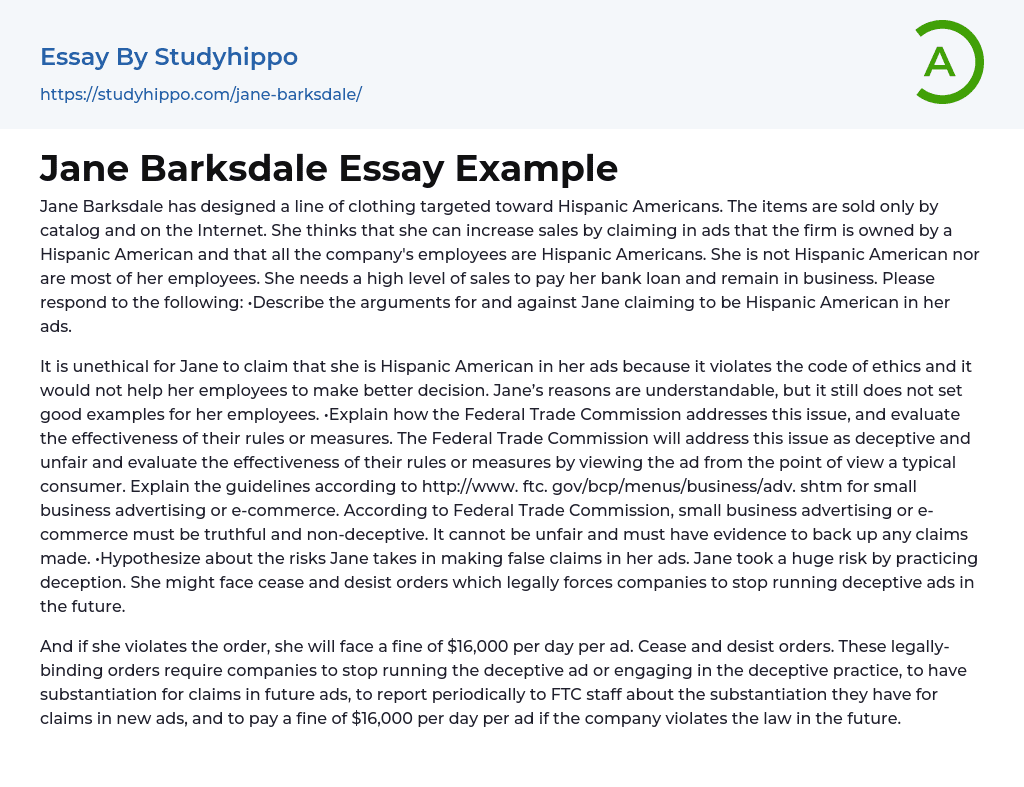Jane Barksdale has designed a line of clothing targeted toward Hispanic Americans. The items are sold only by catalog and on the Internet. She thinks that she can increase sales by claiming in ads that the firm is owned by a Hispanic American and that all the company's employees are Hispanic Americans. She is not Hispanic American nor are most of her employees. She needs a high level of sales to pay her bank loan and remain in business. Please respond to the following: •Describe the arguments for and against Jane claiming to be Hispanic American in her ads.
It is unethical for Jane to claim that she is Hispanic American in her ads because it violates the code of ethics and it would not help her employees to make better decision. Jane’s reasons are understandable, but it still does not set good examples for her employe
...es. •Explain how the Federal Trade Commission addresses this issue, and evaluate the effectiveness of their rules or measures. The Federal Trade Commission will address this issue as deceptive and unfair and evaluate the effectiveness of their rules or measures by viewing the ad from the point of view a typical consumer. Explain the guidelines according to http://www. ftc. gov/bcp/menus/business/adv. shtm for small business advertising or e-commerce. According to Federal Trade Commission, small business advertising or e-commerce must be truthful and non-deceptive. It cannot be unfair and must have evidence to back up any claims made. •Hypothesize about the risks Jane takes in making false claims in her ads. Jane took a huge risk by practicing deception. She might face cease and desist orders which legally forces companies to sto
running deceptive ads in the future.
And if she violates the order, she will face a fine of $16,000 per day per ad. Cease and desist orders. These legally-binding orders require companies to stop running the deceptive ad or engaging in the deceptive practice, to have substantiation for claims in future ads, to report periodically to FTC staff about the substantiation they have for claims in new ads, and to pay a fine of $16,000 per day per ad if the company violates the law in the future.
- Advertising essays
- Audience Theory essays
- Competitor Analysis essays
- Consumer essays
- Marketing Management essays
- Marketing Mix essays
- Marketing Plan essays
- Marketing Research essays
- Marketing Strategy essays
- Point Of Sale essays
- Price essays
- Procurement essays
- Product essays
- Product Differentiation essays
- Promotion essays
- Promotion And Marketing Communications essays
- Retailing essays
- Trademark essays
- Anheuser-busch essays
- Brands essays
- Detergent essays
- Product Placement essays
- Research Design essays
- New Product Development essays
- Advertisement essays
- Brand essays
- Sales Promotion essays
- Advertising campaign essays
- Consumer behaviour essays
- Offer And Acceptance essays
- Wal-Mart essays
- Discover essays
- Culture essays
- Social Control essays
- Citizenship essays
- Social Justice essays
- Caste System essays
- Social Responsibility essays
- Socialization essays
- Deviance essays
- Modern Society essays
- Popularity essays
- Civil Society essays
- Community essays
- Female essays
- Filipino People essays
- Igbo People essays
- Indigenous Australians essays
- Indigenous Peoples essays
- Minority Group essays




